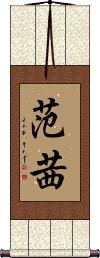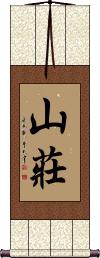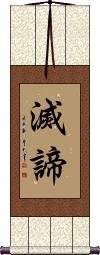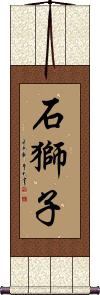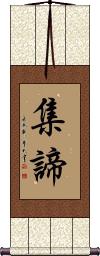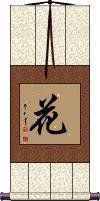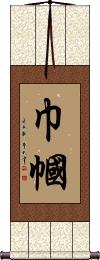Many custom options...
And formats...

Fancy in Chinese / Japanese...
Buy a Fancy calligraphy wall scroll here!
Personalize your custom “Fancy” project by clicking the button next to your favorite “Fancy” title below...
1. Fancy
2. Fancy Nails
5. Four Noble Truths: Elimination of Desire or Attachment
7. Four Noble Truths: Desire and Attachment
8. Flower
9. Woman
Fancy
Fancy
Fancy Nails
(Special Business Name)
Mountain Villa
山莊 is a Chinese word that literally means “mountain villa.”
It can also be translated as a manor house or just a villa. 山莊 is used in hotel names and other fancy titles.
The Single Life
Dokushin-Kizoku
独身贵族 is a Japanese proverb that means “Single Aristocrat” or “Single Noble.”
The understood meaning is that single people can live freely without a spouse or kids to support them. To put it in an old cliché, they are footloose and fancy-free.
If you are a bachelor or bachelorette with few responsibilities and just a thirst for freedom and a worry-free life, this could be your title.
Four Noble Truths: Elimination of Desire or Attachment
Nirodha
滅諦 suggests that once you eliminate desire or attachment to worldly things, only then can you achieve enlightenment.
Realize that things are impermanent. That fancy car, beautiful spouse, big house, and impressive career are things you can't take with you. These things are a flash in the pan compared to the infinite span of history, generations to come, time, and space.
This term is exclusively used by devout Buddhists. It is not a common term, and is remains an unknown concept to most Japanese, Korean, and Chinese people.
See Also: Buddhism | Enlightenment
Fu Dog / Foo Dog
While known in the west as fu dogs or foo dogs, these are actually guardian lions.
These are the lion statues traditionally placed at the entrance of Chinese imperial palaces, imperial tombs, temples, and high-ranking officials' homes. These days, you are more likely to see them at the entrance to a fancy Chinese restaurant.
石獅子 means “stone lion(s).”
Four Noble Truths: Desire and Attachment
Samudaya
集諦 represents the idea that the core of suffering is often the concept of desire or attachment.
This can be carnal desire, monetary desire, or the attachment you have to something that you are unwilling to part with (such as a fancy car). 集諦 is a simplification of the second noble truth which is an exploration into the root causes of suffering - it's deeper than I can go in a few sentences.
This term is exclusively used by devout Buddhists. It is not a common term, and is remains an unknown concept to most Chinese, Japanese and Korean people.
See Also: Buddhism | Enlightenment
Flower
花 is the simple way to write “flower” in Chinese, Japanese, and old Korean.
It can also mean blossoms or can refer to a fancy or assorted pattern.
Note: In some contexts, it can mean “spend money.” However, as a single character, it will be read as a flower.
This has the meaning of Xochitl (flower) in Spanish, so if your name is Xochitl, I suggest this character to represent your name.
More random information about this character:
花 is the Korean surname spelled as “Hwa” before the Korean Romanization reformation of 2000-2001.
It's also a somewhat common given name in China (for females).
花 is a borrowed word from Chinese, so it sounds similar in Chinese and Korean.
Woman
The ancient way to say Woman
巾幗 is the very old way to say woman in Chinese.
A common title in ancient China, this actually refers to the scarf or head wrapping worn by virtually all women at that time.
巾幗 is kind of a cool way to say Woman now. The actual gender character alone on a wall scroll would actually look like a fancy sign for the woman's restroom (WC).
![]() If you are curious, the character to the right means female or woman. Knowing 女 is useful information if you are a woman searching for a toilet in China or Japan.
If you are curious, the character to the right means female or woman. Knowing 女 is useful information if you are a woman searching for a toilet in China or Japan.
Beauty Shop / Beauty Salon
美容店 is how to write “Beauty Shop” or “Beauty Salon.”
If you own such a business, this will make a nice wall scroll to hang up - and many of your Asian customers will be able to read and appreciate it.
When traveling in China, you will see signs like this in the window of any place that offers full services of hair styling, manicures, pedicures, and often shampoo with head and back massage.
However, as a handmade wall scroll, this becomes a very fancy piece of artwork that shows the high class of your business (a great sign for your window if you don't get direct sunlight).
A Traditional Warm Welcome
歡迎光臨 would be the ultimate Chinese “welcome mat.” Except it will be on your wall, and people will not step on it.
In a somewhat literal translation, you could say it means “I feel happy as I welcome you, as you have brought a shining light to this place with your arrival,” or more simply, “I am happy you've come as your presents brightens up the place.”
It has become common for this greeting to be announced by the staff upon the arrival of any customer into a fancy store in China. You will also see these characters on the “welcome mats” in front of 4 and 5-star hotels in China.
Having this on a wall scroll is an extra nice touch. I have seen a few horizontal scrolls with this phrase on the wall behind the reception desk of better hotels or near the front door of fine shops. At the fanciest department stores and restaurants in China, several greeters (almost always young women) will stand by the front door, all wearing sashes with this phrase embroidered. As you walk in, they will bow and say “huan ying guang lin” to welcome you to the establishment.
Note: The first two and last two characters do make words in Korean Hanja but are seldom used as a sentence like this in Korean.
These search terms might be related to Fancy:
A Journey of 1000 Miles Feels Like One
Aspire / Burning Desire
Be Like Water
Believe
Believe / Faith / Trust
Believe in Yourself
Big Dream
Big Dream / Great Hope
Desire
Desire / Craving
Desire / Longing / Craving
Desire / Wish / Aspiration
Dream / Dreams
Dream / Vision
Dream Big / Big Dreams
Dream Come True / Enjoy Success
Elegant / Exquisite / Grace
Faith Hope Love
Fantasy / Illusion
Four Noble Truths: Desire and Attachment
Four Noble Truths: Elimination of Desire or Attachment
Give Up Desire
Hope
I Want You
If You Have Not Been a Monk, How Can You Know What It is Like to Be a Vegetarian?
Imagine / Imagination
Kama - Desire Wish Longing
Life is but a Dream
Lust / Desire / Passion
Mind Like Water
No Place Like Home
Omoi / Desire
One Day Seems Like 1000 Years
There’s No Place Like Home
Tsuki No Kokoro / Mind Like the Moon
The following table may be helpful for those studying Chinese or Japanese...
| Title | Characters | Romaji (Romanized Japanese) | Various forms of Romanized Chinese | |
| Fancy | 范茜 | fàn xī / fan4 xi1 / fan xi / fanxi | fan hsi / fanhsi | |
| Fancy | ファンシー | fanshii / fanshi | ||
| Fancy Nails | 時尚甲 时尚甲 | shí shàng jiǎ shi2 shang4 jia3 shi shang jia shishangjia | shih shang chia shihshangchia |
|
| Mountain Villa | 山莊 山庄 | shān zhuāng shan1 zhuang1 shan zhuang shanzhuang | shan chuang shanchuang |
|
| The Single Life | 独身貴族 / 獨身貴族 独身贵族 | do kushin ki zoku dokushinkizoku | ||
| Four Noble Truths: Elimination of Desire or Attachment | 滅諦 灭谛 | mettai | miè dì / mie4 di4 / mie di / miedi | mieh ti / miehti |
| Fu Dog Foo Dog | 石獅子 石狮子 | shí shī zi shi2 shi1 zi5 shi shi zi shishizi | shih shih tzu shihshihtzu |
|
| Four Noble Truths: Desire and Attachment | 集諦 集谛 | jittai | jí dì / ji2 di4 / ji di / jidi | chi ti / chiti |
| Flower | 花 | hana | huā / hua1 / hua | |
| Woman | 巾幗 巾帼 | jīn guó / jin1 guo2 / jin guo / jinguo | chin kuo / chinkuo | |
| Beauty Shop Beauty Salon | 美容店 | měi róng diàn mei3 rong2 dian4 mei rong dian meirongdian | mei jung tien meijungtien |
|
| A Traditional Warm Welcome | 歡迎光臨 欢迎光临 | huān yíng guāng lín huan1 ying2 guang1 lin2 huan ying guang lin huanyingguanglin | huan ying kuang lin huanyingkuanglin |
|
| In some entries above you will see that characters have different versions above and below a line. In these cases, the characters above the line are Traditional Chinese, while the ones below are Simplified Chinese. | ||||
Successful Chinese Character and Japanese Kanji calligraphy searches within the last few hours...
